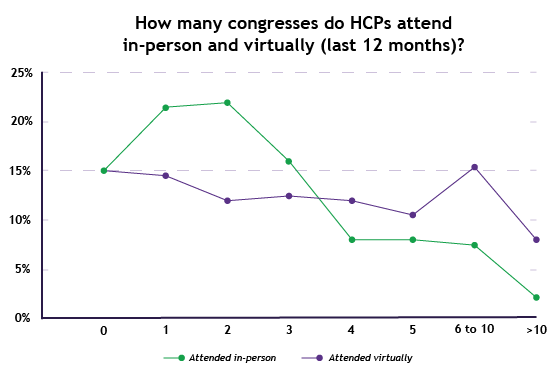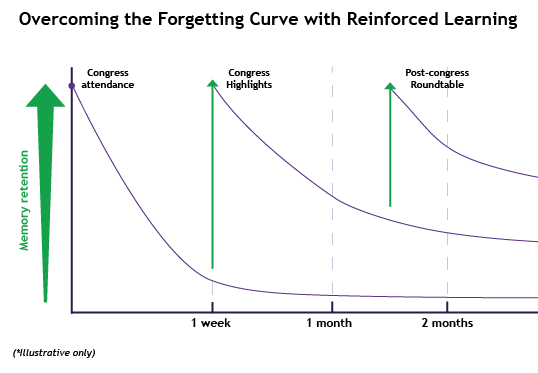Published 9 May 2024
How to unlock the value of congress: Strategies to expand reach, learning and clinical application
Medical congresses are pivotal landmarks in the healthcare calendar. But is their value as a source of the latest and most cutting-edge scientific information being leveraged to its full potential, for the benefit of healthcare professionals and the life sciences industry alike?
All stakeholders are aligned on the importance of congresses. For HCPs, they are hubs for learning and the earliest opportunity to discover new data that may implicate upcoming approvals, indications, and ultimately change patient care. It is no wonder that pharmaceutical companies invest heavily in supporting congresses, preparing research to be presented, running exhibition booths and sponsoring HCPs to attend.
However, time, cost and other factors make frequent travel or even virtual access to relevant gatherings prohibitive for thousands of HCPs globally, and barriers still stand in the way of wider audiences accessing details of key developments beyond the congress.
Meanwhile, the sheer volume of content produced by major congresses throws up further challenges for those fortunate to attend, with HCPs at risk of information overload and unlikely to retain many of their learnings.
This article explores how HCPs engage with congresses and their output in 2024, the challenges they face and opportunities for pharma to maximize the reach and impact of key scientific information.
ON-SITE AND VIRTUAL EXPERIENCES
Emerging from the upheaval of the pandemic, the perceived value of in-person congress experiences has not diminished in the eyes of stakeholders.
Three-quarters of HCPs consider these events a critical or very important source of scientific information, and 82% of pharma feel they provide a similarly vital channel for delivering this content1. On top of expanding their clinical knowledge, in-person attendees also benefit from the opportunity to network, collaborate and debate with colleagues face-to-face.
As a result, on-site congress attendance has bounced back strongly; EPG Health’s multi-stakeholder research indicates that, prior to 2020, HCPs travelled to 2 such events per year on average. By 2023, they were already back to attending around the same number of congresses in-person.
However, not all trends have reverted to pre-pandemic norms. In addition to physical attendance, HCPs now tune in to far more congresses virtually (3 on average each year), with almost 25% reporting that they attend a staggering 6 or more online.
Although all stakeholders consider virtual to be of lesser importance than in-person attendance, it is apparent that medical professionals continue to demand the greater convenience and lower costs associated with online access, as unlocked on a large scale during the pandemic.

ACCESS BARRIERS
Despite the enthusiastic, post-pandemic return to face-to-face events, and the ongoing take up of virtual attendance, healthcare professionals continue to face several barriers to accessing educational information and output from medical congresses.
It remains the case that an overwhelming majority of HCPs worldwide simply do not have the time or resources to engage with every live congress relevant to their practice. This includes general practitioners and nurses on the front line of patient care, who are not expected to attend congresses and must rely on other sources for consuming and understanding the latest critical scientific advances.
Further challenges around accessing congresses and their output include:
- • Evidence of rising registration fees for virtual attendees, and some smaller congresses having “either substantially cut real-time virtual access, or simply pulled the plug”2
- • Session recordings hosted via congress platforms can be difficult to find and consume on-demand, and are typically available only to registered attendees, not the wider HCP community
- • 63% of meeting abstracts never go on to full publication3, and for those that do, the usual timeline is 12-18 months post-congress
Combine these factors, and it becomes clear that further action is needed if medical societies and the pharmaceutical industry wish to maximize the reach and impact of valuable scientific information shared at congresses, beyond the event.
FROM LEARNING TO IMPLEMENTATION
The core purpose of medical congresses is to provide educational value for healthcare professionals, with pharmaceutical companies keen to ensure their own output is as widely disseminated and understood as possible.
But let’s place ourselves in the shoes of an attending HCP for a moment. You travel to a major international congress covering your specialty area. There, you spend three days in a packed venue absorbing dozens of sessions, taking notes, networking with colleagues, and, if you have time, making a quick dash round the poster hall, fully intending to implement your learnings.
How much of the information presented to you over the course of the congress are you likely to have fully taken in? And the following week, once you have returned to clinical practice, how much will you have retained and be ready to apply?
“Congresses hold incredible educational value, but they can be a wall of information overload for a healthcare professional. For pharma, this makes it difficult to ensure any key data they have published is not only seen but understood and retained to the point where the healthcare professional can implement it. I don’t think that’s always happening; the information will often be forgotten after the noise of the congress.”
Jonathan Macdonald, Chief Operating Officer, EPG Health
Research on the ‘forgetting curve’ reveals how learned information fades from memory over time; within an hour, an average of 50% is forgotten and, by a week later, this rises to around 90%.
Further to this, a recent Harvard study found that the process of ‘forgetting’ does not reverse changes in the brain resulting from learning. What has been forgotten is not erased, but – with the brain no longer in a “naïve” state – can be reactivated with a “jump start”.4
So, to ensure information from the congress sticks beyond the initial learning experience and makes its way into clinical practice, where it can have the desired effect on improving patient treatment and outcomes, repetition and timely reinforcement is essential.

EXPANDING REACH AND IMPACT
In order to help solve the challenges described, the following is clear:
- • HCPs need open and convenient access to the most clinically-relevant medical congress output – 81% have high demand for key disease topic takeaways from events they did not attend5
- • Reinforcement of learning must come swiftly – 90% of HCPs say access to information beyond the event helps them to apply new medical approaches more quickly6
There is strong incentive for pharmaceutical companies with important data releases at a congress to meet this demand, thereby maximizing the reach of their latest scientific information and the impact of their investment in the event.
However, as all in the Industry will be fully aware, compliance stands firmly in the way of promoting data pertaining to pre-launch products, and it can take months to receive approval for hosting congress output on pharma-owned digital platforms.
An effective and compliant solution is to fund – while remaining entirely at arm’s length – independent congress highlights that cut through the noise for healthcare professionals. These can be well complemented by further independent follow-up activity, for example expert roundtables facilitating peer-to-peer discussion around important topics from the congress.
“Congresses exist to educate, inform, update and steer direct clinical practice; providing post-event coverage that retains an educational value should be the goal. This needs to integrate not just the biggest spotlight grabbing headline from a congress, but summarize the key clinically-relevant takeaways that HCPs can put into practice, aligned to clear learning objectives and impact metrics.”
Ben Gallarda, Head of Scientific Services, EPG Health
Congress highlights are most effective when provided…
- • Via independent websites – 74% of HCPs consider these critical or very important channels for accessing scientific content (their number 1 preferred source)7
- • In bite-sized formats – HCPs prefer short form text and video over all other formats when consuming scientific information8
- • Alongside key opinion leader interpretation for peer-to-peer guidance on clinical application
- • With convenient onward journeys to further educational content within the same therapy area
Going live within 3-7 days of the event and delivering on each of the above, EPG Health is a leading publisher of Congress Highlights and related post-event coverage, hosting output from numerous scientific meetings on the independent HCP website Medthority (www.medthority.com) each year.
This content expands the reach, lifespan and impact of valuable information from congress, engaging thousands of healthcare professionals with practice changing education that supports better patient outcomes.
Less than half of pharma currently support post-event congress coverage or highlights for non-attending HCPs. Want to improve access to this critical information? Book a meeting to find out more.
1, 5, 7, 8 The Future of HCP Engagement Impact (2023), EPG Health
2 2023 Healthcare Professional Congress Experience Report, Ashfield Event Experiences / IPCAA
3 Full publication of results initially presented in abstracts, Cochrane Database of Systematic Reviews 2018, Issue 11
4 Forgetting, fast and slow (2022), The Harvard Gazette
6 The Evolving Role of Websites for Healthcare Professionals (2019), EPG Health
News & Views
MORE ARTICLES